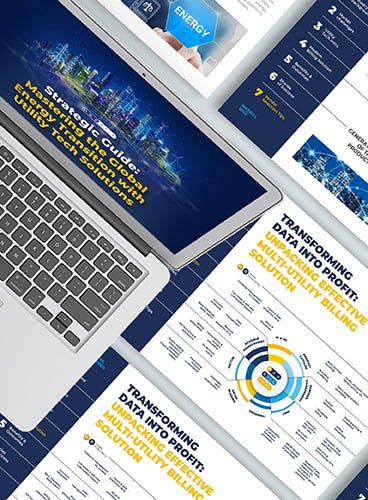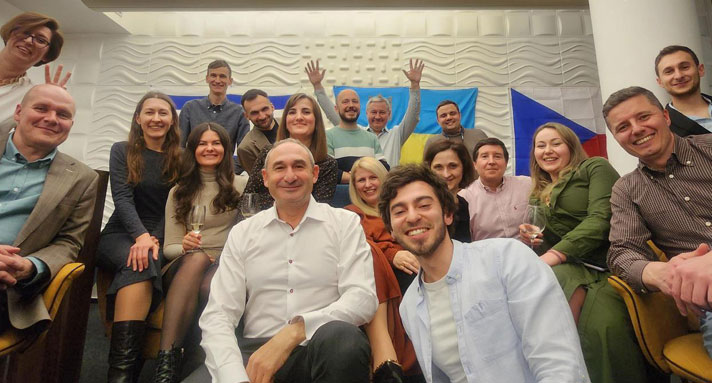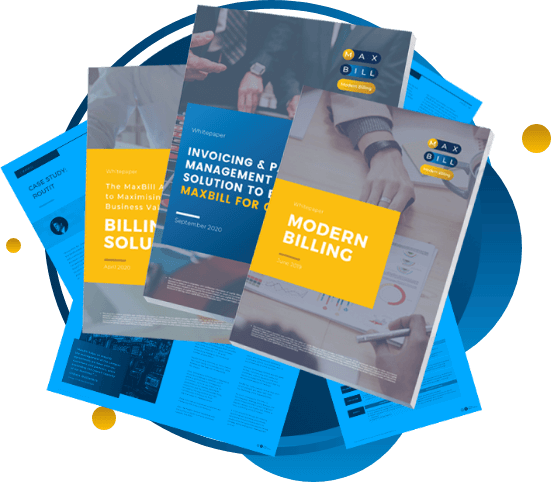As the iGaming industry keeps growing and evolving, getting more layered and complicated at times, the government rush to introduce more and more regulations across countries via various gambling commissions and gaming control boards to keep things under control. The pandemic, of course, affected this process significantly, facilitating digitization and helping companies realise the value of a diversified and regulated market.
As the industry is still adapting to doing business in the new realm, MaxBill turned to research on the impact of regulations on iGaming businesses and the important role that digitization can play in managing that impact. The results were quite interesting and, at times, even surprising, so our professionals, Daria Yakovenko and Yaroslav Tkachenko, have been invited to the panel discussion with Zoltán Tűndik to share our findings with the iG community at the Q3 Virtual Quarterly Meetup, organized by European Gaming News and HIPTHER Agency earlier this month.
Here are some of the most interesting takeaways in the form of Q&A that our team shared during the event.
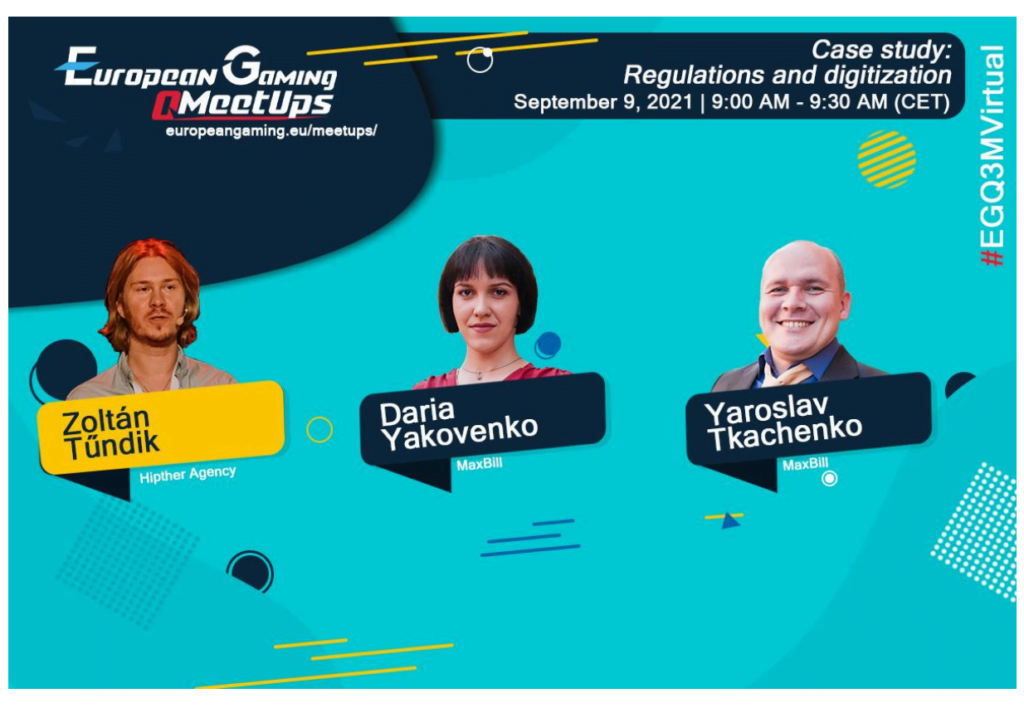
Zoltán: So, guys, tell us about the origins of this survey, I think it was back here, at the EG Q2 Meetup that you launched it, right?
Daria: We decided to create this kind of survey because we’ve visited many meetups and saw that this topic is extremely important for the iG community. Also, we collaborate with huge B2B providers like NetEnt, which is now a part of Evolution, and companies of such scale and see how they deal with the consequences of these regulations. We specialise in back-office operations, therefore, always looking out for what’s going on on the market and how we, from our technological side, can help the businesses, how we can provide them with the best possible solutions for their needs and answer the most pressing questions for the industry.
And, of course, seeing how close the iG community is, for us, was very inspirational because I don’t think we’ve seen anything like this before across other industries we are working with. Everybody knows everybody, especially here, in Europe, and with recent regulations, even though they’re introduced in different countries at a different pace, the effects they’re causing are pretty much the same for everyone.
That’s why we wanted to gather all of the opinions about such effects in one place and find out if there’s something positive coming from these regulations. Because the most popular opinion we heard is, of course, that it’s been causing a lot of inconveniences (read: headache) and a lot of change, so our goal was to see if there was something more to it.
So what we have noticed is that when we asked the respondents how their businesses were affected by the regulations, the majority (38.9%) answered that the effect was negative, 27.8% said that they can’t determine yet if there’s any effect at all and 16.7% actually said that they feel these consequences were very positive.
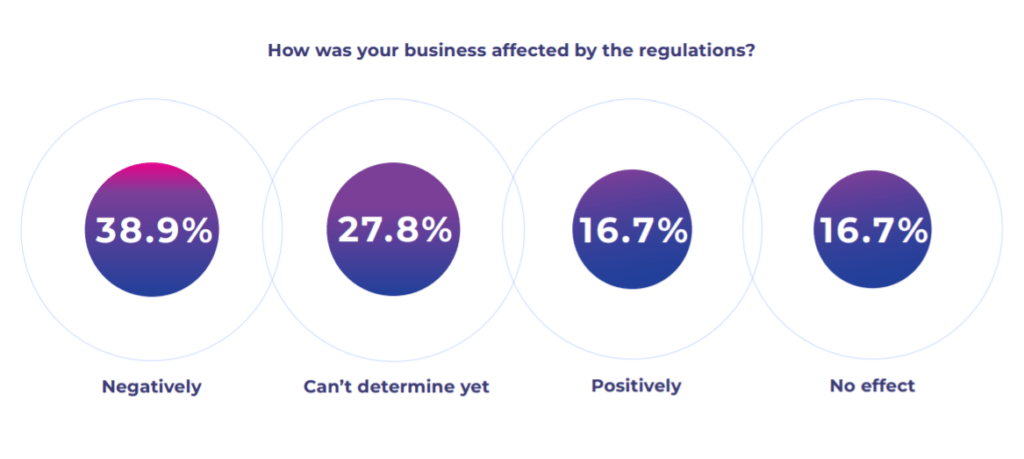
Among the most common negative effects there were revenue losses in the first place, of course, and then just general inconveniences and disruptions to their back-office processes and internal operations.
To go into more detail, the most affected parts of those operations included, first and foremost, the licensing procedure; of course, we heard about that a lot as it was altered for many companies. It is especially true for smaller companies that are trying to get into the market, and additional pressure was added on them because when COVID hit, land-based casinos got closed down and many operators started moving online. For that, they needed to obtain licences very quickly in huge quantities, which also made its impact on the procedures defined by the regulators.
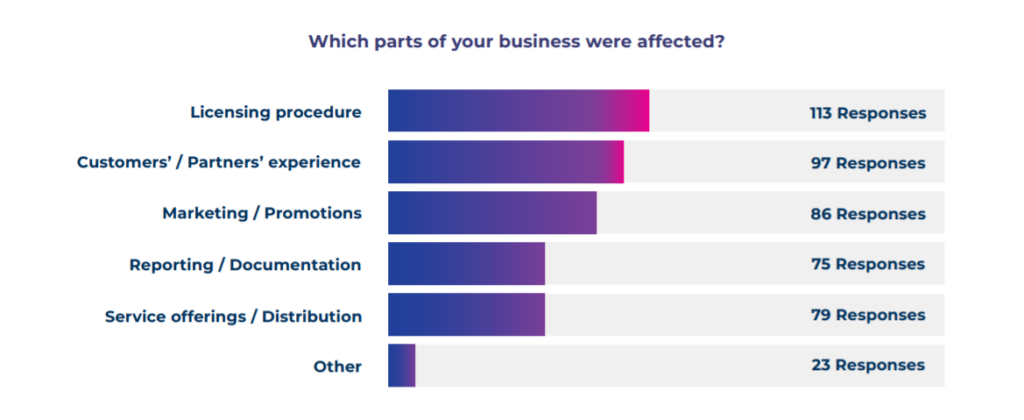
The other thing that was affected is the customer and partner experience. We saw that many specifics and inconsistencies between procedures, that were instilled by the regulators of different countries — sometimes even different regions of one country, — led to iGaming businesses being disconnected from their partners, their workflows starting to be out of sync, payment cycles became longer and more complicated.
Moreover, we noticed that reporting and documentation were affected a lot too due to the fact that many of these regulations lacked transparency and clarity and sometimes businesses are not even sure what exactly they have to comply with. There was also an opinion from one of the respondents that these regulations are not even fair to all of the players in this market, which may in part be because the logic behind the taxation rules was not properly explained to the businesses by the regulators, for example. It would be a lot easier for larger companies to handle the consequences of the regulations than for smaller ones and for startups, and that — in the opinion of another respondent — could cause an unhealthy ecosystem within the market.
And of course, marketing and promotion activities were significantly affected as well, due to many restrictions coming with the regulations and, in many cases, causing businesses to re-think their entire marketing strategy.
Following the fact that the partner and customer relationships have been significantly affected, it was also quite unsurprising when the survey showed that the majority of the respondents changed their own approach to customer and partner management as well.
Finally, what was extremely interesting for us as a technological solutions developer is also the fact that when asked what processes the respondents have adjusted or plan to adjust following the regulations, ‘technologies’ were the most common answer.

Because we firmly believe that when something so drastic happens to the market, something comes from the outside and changes the rules of the entire game, businesses should ask what they can do inside their own structure to manage the consequences of these changes. And the answer to that question is almost always “implementing the technologies.” Because this is the exact way, in which the businesses can take back at least part of that control over their situation and their procedures. And the results of that survey only reinforced this belief of ours.
Download The Impact of iGaming Industry Regulations: Community Insights 2021 report to see all of the takeaways from the research.
Zoltán: You mentioned earlier that you wanted to explore what advantages iG businesses see in the regulations, what did you find out?
Daria: The main advantage the respondents mentioned was the fact that these regulations could create a more safe environment for the players, the users, the customers and, at the same time, a more fair and sustainable system for the businesses to grow, expand and build new partnerships. But only on the condition that these regulations and procedures will be unified across the entire EU market, otherwise, it just won’t work.
Zoltán: Yes, good luck to us all with the wishful thinking, because this has been in talks for the past 7 years already.
Zoltán: How exactly implementing new technological solutions inside the company can help with managing the effects of the regulations coming from the outside?
Yaroslav: I can give you an example from our own experience. It all started 3 years ago, one of our partners came to us and said: “Look, you’re doing billing for us and we’re very happy, but what about gaming taxation? Because it’s a worldwide mess right now, each and every regulator in every separate territory has its own procedures. It’s hard to maintain all of this reporting and documentation because it has to be very accurate, it’s not just an invoice for your partners, after all. It is the financial data that you’re sending to the government and making errors, in this case, is absolutely not an option. So how can you help us?”
We went through many discussions, taking into account all business aspects and requirements and decided to use our existing platform for billing as a base. We did a few technological tweaks in order to maintain all of these various regulations and special rules, specific reporting and presentation rules from different regulators, all of which had to be localised.
While developing this project we had a few challenges. The first one being all the various formats the data from our clients was coming in for processing. Sometimes those were raw .csv files, sometimes complex multi-layered .xlsx files with various tabs with a lot of complex tables inside each of them. You had to upload this data first to somehow be able to correctly process it automatically. To solve that, we configured a mapping interface.
The second challenge was to configure all of the different rules into one system and determine the technology we can use to be able to intake and calculate all of them. Because, as you all know, gaming tax is very different from, let’s say, VAT calculation which is more or less the same worldwide. Even within one country, different regions can have different gaming tax rules. We solved it by using the business process modelling tools (like Camunda), to configure all these rules and dependencies, as well as using our in-house scripting engine, which could process different formats of these rules – whether UI-based or script-based or a combination of both.
Finally, the third challenge was to create various types of reports and presentations for the regulators, with different fonts, languages, designs. We had to reconfigure our formatting server specifically for that kind of functionality required from the outside.
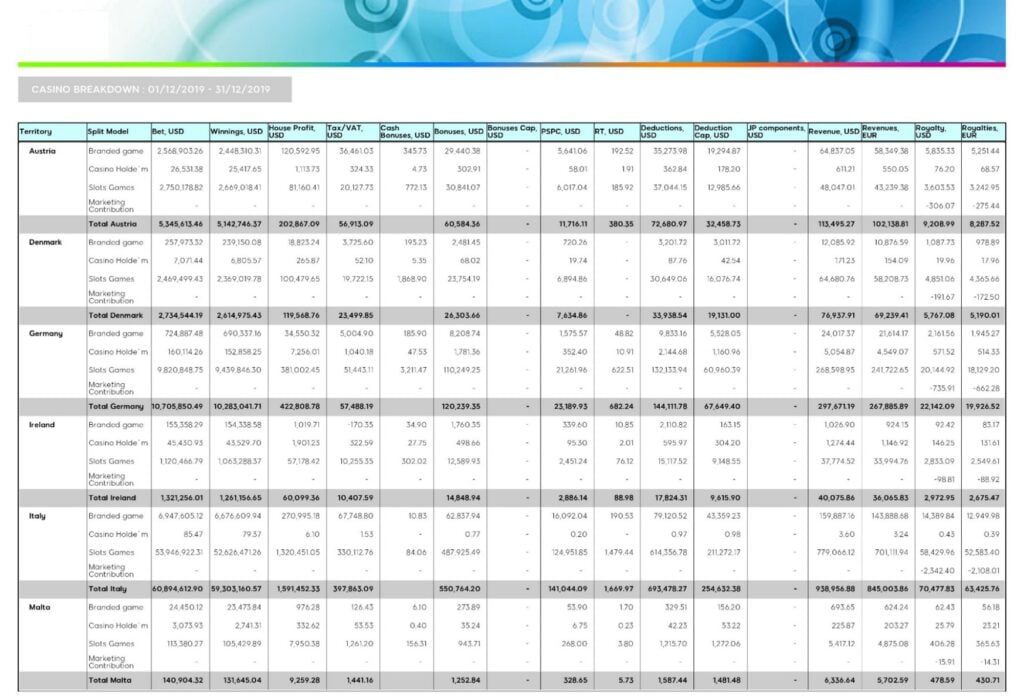
When we overcame all these challenges, the client received the ability to easily add any country they’re operating in to their calculations and reports. The reconfiguration of these rules became extremely easy, without the need to manually calculate anything at all. In addition, they had the opportunity to reinforce their reports with incredibly detailed and highly accurate calculation breakdown documents which our system also easily provides.
Zoltán: It’s great to hear that many challenges have been overcome in the past few years, especially in data processing. Last question, what is the difference between digital transformation and digitization, if there is any?
Yaroslav: I think there’s a big difference. As for me, digitization is only about automating some particular aspects, tasks, actions — you did something manually, now you’ve automated it, that’s great, you’re happy. However, digital transformation means that your entire workflow is transformed, cooperation between departments is improved, sometimes new departments or roles are created, with the help of new technologies.
For example, with this gaming tax module we provided to our partners, they completely changed their process of reporting. Before, it was done manually with many approval stages; sometimes it took weeks to get it all done. Moreover, they had to form a special team of people whose task was preparing reports and making multiple checks and revisions. Of course, being extremely important documents, they involved CFO’s approval first and then, should be submitted to government regulators. In that case, the cost of one mistake could be very high.
Right now with everything automated, this team was transformed and transferred to doing something much more interesting and creative than just sitting over Excel files, going back and forth with the corrections. Now, it’s just a few clicks of a button — and the report is issued, checked, approved and sent to the regulator. Very simple, very fast, no need to involve the entire team, no need to involve CFO every quarter, making half of the back office disappear for weeks just to prepare the necessary documentation.
So, in my opinion, that’s the key difference between simply automating some tasks and completely changing the entire workflow within the company.
Daria: I’d also like to add that digital transformation and implementing a large technological platform to automate complex calculations and documentation processing gives the business a solid framework to set up the process once and when whatever changes, rules, procedures come from outside, just upload these new conditions within the system. And apart from the obvious elimination of human errors, it would be much easier to comply with and adhere to all the enforced procedures and guidelines.
View full panel discussion with Daria and Yaroslav:
